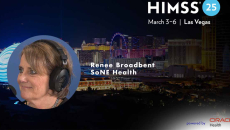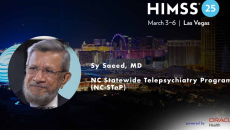HIMSS25
Food Allergy Nursing Association educates nurses about the emerging health concern so they can deliver adequate care and better advocate for patients, says Olga Kagan, FANA president and CEO, and 2025 Changemaker Award recipient.
Rather than simply layering technology atop inefficient clinical practices, it's key to take an "urban planning" approach and rethink their structure, says Dr. Anwar Jebran, medical director of population health informatics at Oak Street Health.
Phishing with voicemail scams, deep fakes, medical document forgeries – artificial intelligence is "lowering the bar of who can engage in these activities," says Etay Maor, chief security strategist at Cato Networks.
Ambient AI is helping to restore how clinicians connect with patients at the point of care and it's also reducing their after-hours documentation burden, according to Julie Frey, Wolters Kluwer VP of provider product.
A partnership that aims to provide culturally sensitive care is reducing hospital stays by leveraging digital tools that improve access to treatment, says Renee Broadbent, SoNE Health's chief information officer.
Before implementing AI tools, leaders must ensure data flows freely between their EHR and practice management systems, and that they know how the tool will fit into existing procedures, says Matt Murren, CEO of True North ITG.
Advocacy is central to HIMSS' work, and forums on healthcare topics and letter-writing campaigns to policymakers help educate and involve the public, says Larry Voyten, chair of the HIMSS Chapter Advocacy Task Force.
The state's MOTHeRS Project has helped virtually connect high-risk pregnant women in rural areas to OB-GYN, mental health and diabetes care. Dr. Sy Saeed of the North Carolina Statewide Telepsychiatry Program explains how.
When health systems upgrade their IT infrastructure, they should also train staff to use AI and other new technologies, says Dr. Guido Giunti, chief data officer at Dublin, Ireland's St James's Hospital.
Ever since financial institutions have significantly increased their security preparedness, bad actors have turned to healthcare organizations, seeing them as more vulnerable – and lucrative – targets, says Dr. Eric Liederman, CEO of CyberSolutionsMD.









